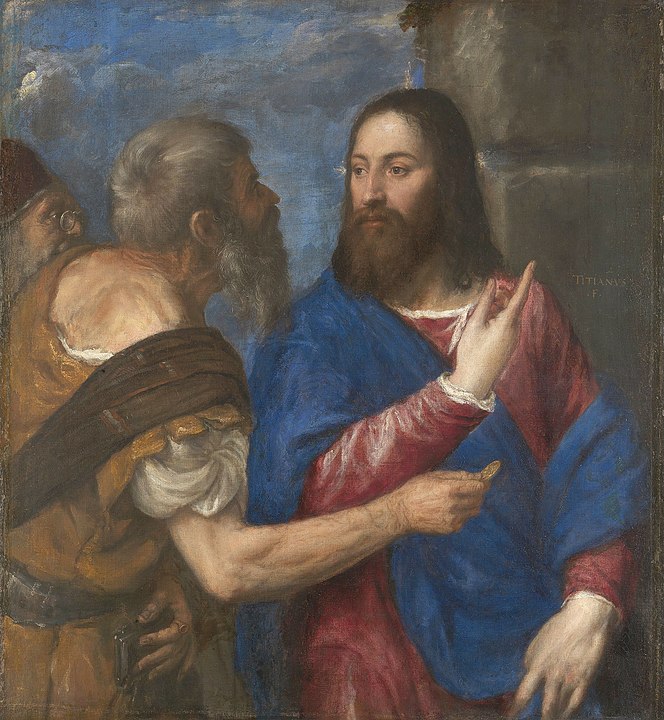Sermon 10/18/2020 “Render unto who?”
Preacher: Jo J. Belser
Location: Church of the Resurrection at VTS in Alexandria, VA
Text: Matthew 22:15-22
Day: 20Pentecost, Proper 24, Year A, during a pandemic

In today’s gospel lesson, Jesus tells us to, “Render … unto Caesar the things which are Caesar’s; and unto God the things that are God’s.” That’s the King James Version; our New Revised Standard Version of today’s gospel lesson uses different words but means the same thing: “Give … to the emperor the things that are the emperor’s, and to God the things that are God’s.”
This seems straightforward: Pay your taxes to support your government and pay your pledges to support your church. God bless America and God bless Resurrection and God bless You. And God WILL bless us—we think and hope and pray—as long as we are good citizens and good parishioners and good people who pay our dues and help others.
And what preacher in her right mind would dispute such an interpretation, being (as we are) at the start of our stewardship campaign for 2021? But I must tell you today that THIS interpretation of today’s gospel lesson, to pay our dues, is how we have watered down what Jesus meant when he told us to, “Render … unto Caesar the things which are Caesar’s; and unto God the things that are God’s.”
What Jesus meant NEEDS watering down, needs fixing, needs minimizing if our goal in life is to accumulate the most “toys,” the most things, the most money. Because who could live up to what Jesus wants us to do, “Render … unto Caesar the things which are Caesar’s; and unto God the things that are God’s?” This isn’t about paying our dues, but paying what’s DUE.
“Show me the money,” Jesus instructed those who presented him their trick question that day. In Jesus’ day, there was no paper money, just coins. And there were two categories of coins in Roman-occupied Palestine: Roman coins bearing the emperor’s image in which taxes had to be paid, and Jewish coins used for paying their Temple tax, their version of pledging. Ironically, minting of the official Jewish Temple coin had been taken over by Herod and bore the image of the pagan Greek god Heracles. However—I learned this week—Jews had accommodated this desecration of their Temple coin by ruling that money was unclean only by the use to which it was put, not its design. And the Roman coins were a big theological controversy: Did the use to which the coin was put—paying taxes to Caesar—make the coin unclean?
The trap here is clear and brilliant, as is Jesus’ answer. “Show me the tax coin,” Jesus told those looking for a way to arrest him. And here’s our first clue about Jesus’ answer: Jesus didn’t carry a Roman coin. He was being confronted just after he had overturned the tables in the Temple where money of all kinds was being exchanged for the Temple coins. Most likely, Jesus didn’t have either kind of coin on him, no money at all.
Let’s pause there a minute. Did Jesus not need any money, expecting his “roadies,” those poor fishermen who followed him, to pay his way in this life? Or did Jesus have no money on him because his treasurer, Judas Iscariot, handled all the bills?
Jesus taught people, healed people, loved people, and made them all whole. He didn’t charge people for his interactions with them, or for healing them. The healing Jesus offers is totally free—no dues, no fee, no hidden costs of any kind—but what Jesus wants from us much more expensive.
Scripture tells us Jesus’ financial backers, the people who financed his ministry, were women, women who saw the value of the life Jesus offered them, the value of being part of the “family of God.” There must have been a lot of male pledgers, too, after Jesus’ resurrection, given the way the early Christian Church was formed and managed.
I wonder if Jesus’ financial backers were his Finance Committee. Scripture doesn’t say, other than to say Jesus’ treasurer was corrupt, doesn’t even hint there was an organizational process for determining Jesus’ program and mission or his budget. Or did people just rush to give him whatever he needed, like food and clothes and shelter and the colt on which he had just ridden into Jerusalem?
We should reflect on all this as we discern what our financial pledge will be to Jesus’ work by Church of the Resurrection in 2021. Jesus’ teaching on taxes isn’t “pay your taxes and pay your pledge, too.” Instead, Christ Jesus’ ambiguous response, “Render … unto Caesar the things which are Caesar’s; and unto God the things that are God’s” is this: “Each of us must give what we decide we owe our nation and to God.”
But here’s Jesus’ “trap,” his turning the tables on them again and on us: “What, really, is Caesar’s?” Nothing! Every single thing we have, is God’s. And I don’t just mean our money. I mean our health (or lack thereof). I mean our brains (or misplacement thereof). I mean how we use the time we are given.
“Render … unto Caesar the things which are Caesar’s…”
Jesus could have meant, “Give Caesar nothing.” Or he might have meant, “Pay the taxes Caesar asks.” We each must decide. Whatever we decide, we must not confuse what we pay for civic order with what we owe God. “Render … unto God the things that are God’s.” All we have is God’s. And we must carefully consider what portion that God has given us to return to God’s unrestricted use.
Jesus told the Temple elite to look at the image on the coin to see who owned it and then give it to its owner. If the image on the tax coin is Caesar’s so give it to Caesar. The image on the Temple coins, remember, was a pagan god, so by implication giving the Temple coin belong to Heracles. But the image on us, God’s people, is God himself.

Today, at least in the United States of America, our folding money and our coins bear the image of a dead figure in our nation’s history. But each also declares, “In God we trust.” So, the choice is yours, “Render … unto Caesar the things which are Caesar’s; and unto God the things that are God’s.” You decide.

